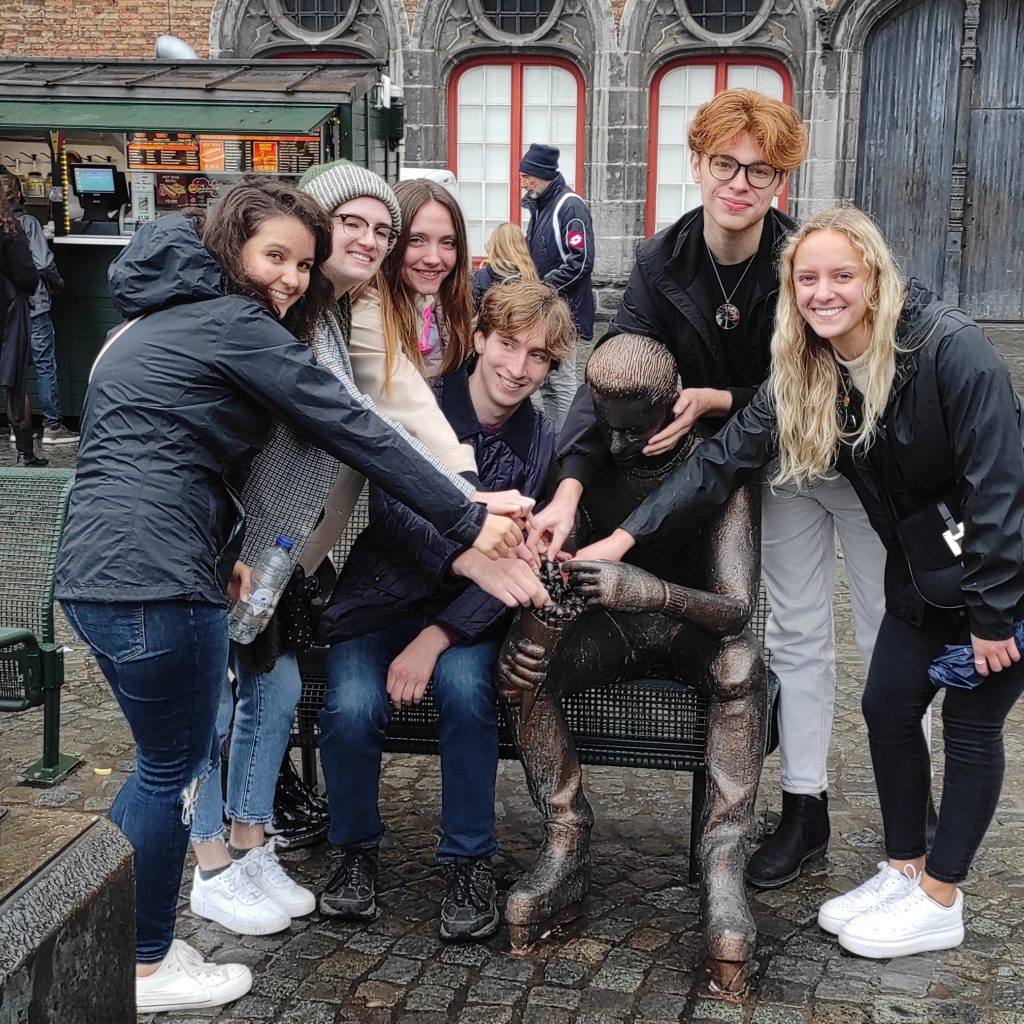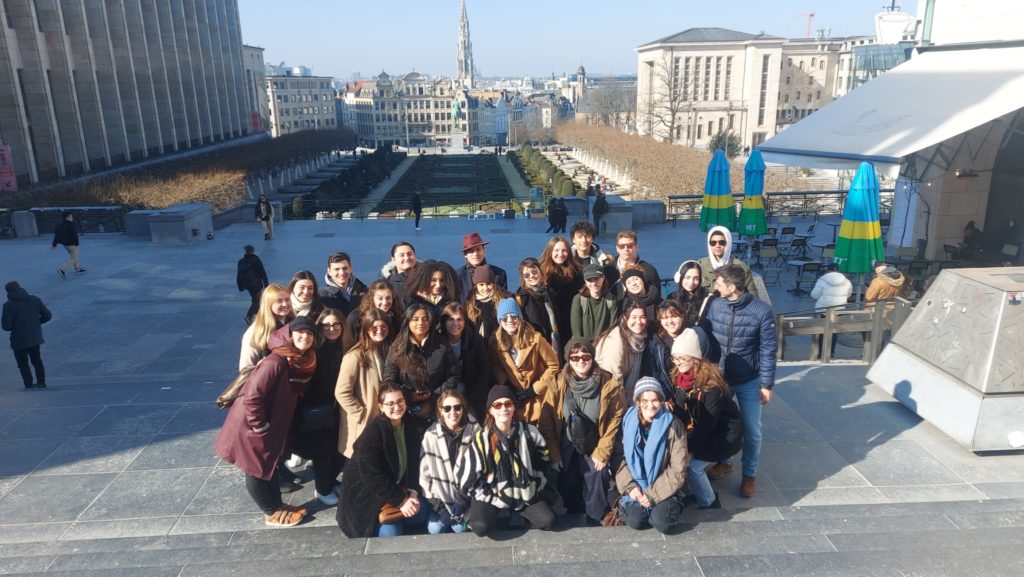Maymester & Winter Term in Brussels
Join us and experience the vibrant capital of the European Union with our new Maymester & Winter Term programs in Brussels. Located at the heart of Europe, Brussels provides a culturally diverse and exciting study abroad destination. Indulge in the city’s renowned delicacies such as waffles, beer, chips, and chocolate while exploring the complex issues of the European Union. SIS will ensure you make the most of this enriching experience.
Students will have the opportunities to immerse themselves in the multicultural city by living with local host families and exploring its vibrant culture. With 184 nationalities represented, Brussels stands as one of the world’s most diverse cities in the world
Enrich your education and broaden your horizons with SIS Intercultural Study Abroad in Brussels.

Program Dates
Winter-term 2024-25: December 29th 2024 – January 18th 2025
Maymester 2025: Sunday, May 18th – Sunday, June 7th 2025
Arrival and accommodation
After meeting the group on the arrival day at Zaventem Airport, SIS staff will accompany students to Brussels and help them transition into their local host families.
Academics
This multifaceted program includes a total amount of approximately 45 hours, that ultimately grants 4 credits. A portion of the course hours will be devoted to a fun crash course of French and Dutch (the two official languages spoken in Brussels) to give students the chance to get a taste of this multilingual and multicultural reality, irregardless of the course offered for the term.
The rest of the course work concentrates on one of the below course offerings, taught by SIS Intercultural Study Abroad faculty in Brussels. The course will include either visits to sites of interest in the community or a series of meetings with key stakeholders at the European level, civil society and representatives from NGOs. See the following descriptions for more about the courses. Please note: Both courses may not be offered each term, please check with SIS to find out which course will be offered each program.
45 total contact hours – Brussels and Belgium are renowned worldwide for their European institutions and exceptional culinary delights. Among the notable contributions originating from Belgium are:
- Belgian fries (often mistakenly called French fries) with a wide variety of accompanying sauces.
- Beer, particularly the Abbey beer crafted by Trappist monks.
- Pralines, delightful chocolate treats with a crunchy exterior and an explosion of flavors inside, perfected over time by master chocolatiers.
This course aims to delve into the origins and global dissemination of these Belgian delicacies. Behind their history lie significant cultural and historical aspects, such as Belgium’s colonial past in the Congo, which facilitated the importation of cocoa. Additionally, intriguing chemical aspects are explored, particularly in the production of the Lambic beer unique to Brussels.
The classes are designed to be interactive, encouraging students to read, discuss, and reflect, while most importantly, savoring these delights! Students will participate in excursions to breweries, beer factories, fries museums, and chocolatiers for guided visits and tastings. Moreover, they will have the opportunity to engage in cooking lessons to create their own pralines and beers. The readings for this course encompass historical and cultural perspectives, providing a comprehensive understanding of these culinary treasures.
This first section of the course will provide students with an overall knowledge of the system of protection of fundamental rights in the EU, as well as its articulation and relations with other systems of protection (i.e. the different national systems in the EU, the Council of Europe, the European Convention on Human Rights etc.). Students will analyze and study the Charter of Fundamental Rights of the European Union (CFR), the European Convention on Human Rights (ECHR), as well as the role played by the European Court of Human Rights. This section will also focus on the role played by the Council of Europe (CoE), an international organization whose mission is to promote democracy and human rights. Despite being different and separate entities, when it comes to the protection of human rights, democracy and the rule of law, the CoE and the EU share the same fundamental values and play complementary roles.
In the second section of the course instructors will present the EU drugs policy, focusing on the strategic and operational measures that EU Member States have taken to address security and health implications of drug trafficking and use. Students will learn more about the way in which the EU coordinates the fight against illicit drug trafficking as well as the protection of public health. They will discuss the EU drugs strategy 2021-2025 aiming at improving the well-being of society and of the individual, promoting public health, and offering a high level of security for the general public. Since the involvement of agencies and civil society is one of the cornerstones of EU policies, students will meet and interview agency and NGO representatives and key figures. Lastly, they will learn about the Council of Europe Pompidou Group’s work that contributes to the development of effective and evidence-based drug policies founded on human rights. Its wide-ranging expertise provides political guidance and practical tools that help decision-makers to carry out measures to reduce drug trafficking and use, better treat substance use disorders and resolve negative impacts of addictions in society. The Pompidou Group’s priorities are: promoting sustainable drug and addiction policies in conformity with human rights; safeguarding democratic societies by addressing addictions that impact human autonomy; protecting the rights of people belonging to vulnerable and risk groups; reducing trafficking of illicit drugs.
Service Opportunities
Service-Learning activities will focus on engagement with the local community through schools and neighborhood organizations such as the parish community, sports teams, and local child and elderly care providers.
Included in the program
In addition to courses:
All meals, City museum visits; Internet use @ facilities; One day trip within Belgium, 2 course-related excursions; SIS staff assistance.
So what are you waiting for? Apply now or write to info@sisstudyabroad.com!




